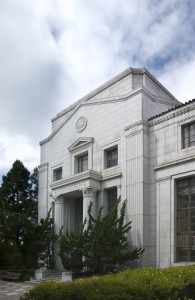While competitiveness can boost national rankings, it doesn't boost community morale, Sastry said. Parents complain to him that their kids are pulling all-nighters studying, only to get rejected. And California companies tell him that without enough well-trained Americans, they’re stuck lobbying for H1B visas.
UC BERKELEY GRADUATES
For the incoming class this fall, Sastry accepted about 700 applicants. Most had perfect 4.0 grade-point averages, with just a handful as low as 3.6. Sastry said, "There's roughly twice as many students who would meet all of these extremely high GPA requirements that we were not able to admit."
Responding to Sastry's charges, UC Berkeley Provost George Breslauer countered in an email that his administration is in fact nimble at responding to its students. He made two important points: First of all, lots of science and math classes are seeing "a sudden surge in demand" -- not just engineering. Secondly, the administration is adding introductory classes and instructors to meet these sudden surges.
Engineering programs nationwide grapple with sky-high dropout rates. According to the American Society for Engineering Education, about 40 percent of U.S. engineering students didn't finish their four-year programs. But at Berkeley, fully 80 percent go on to get their degree.
Erin Davis, a 2013 graduate, is among the few women in engineering. Davis said studying alongside mostly male classmates was emotionally exhausting and she considered dropping out. But supportive professors, plus acing a midterm, convinced her to stick it out. She said she realized, “OK, maybe I'm not as stupid as I think I am.”
The 22-year-old said she is taking a job at an investment firm in Portland. “They have massive portfolios for very rich clients, and I'm doing operations (to) implement the research team's ideas. It’s basically Industrial Engineering 221.”
The average starting salary for graduates of her engineering college is about $75,000.
According to President Barack Obama, grads like Davis are in short supply across the country. Two years ago the president and his Jobs Council challenged engineering colleges to produce 10,000 more graduates a year.
Sastry has managed to increase the total number of engineering graduates by about 17 percent in the last five years, by doing more with less. He's had to cut four faculty in that same period of time, and said “it's not possible to squeeze in any more students.”
THE UC SYSTEM
California has been cutting support for higher education radically since 1990. But Sastry said budget cuts, which have been ongoing, are no excuse to underreact to the changing job market. "Public schools have been too preoccupied with guaranteeing their existence, guaranteeing their survival, so to speak, while these demands have been changing."
Daniel Mote is the incoming head of the National Academy of Engineering, which has advised Obama's Jobs Council. He also served as vice chancellor at UC Berkeley during the 1990s.
Mote does not take a position on the conflict over the engineering college, but he does say there's an important homework assignment here. "The question the provost has to address is whether these fluctuations are long-standing, or whether they're just temporary because of some particular surge in interest that's only short term, maybe a year or two."
Mote believes things like IT and cybersecurity are not fads, and that the U.S. is falling behind other countries in training our share of the global workforce. “Look at engineers as a proportion of all college grads,” Mote said, “and in fact the one country is the world that closely matches the United States is Mozambique.”
The UC system has had not a concerted plan to grow its engineering programs -- or science, technology or math -- since 2005. The UC president's office said there’s no new plan in the works at the systemwide level to expand any STEM field. Meanwhile, they have seen an increase in students choosing STEM majors across the individual campuses.
UCLA Engineering has awarded 36 percent more bachelor’s degrees in the last five years, while cutting three faculty. Dean Vijay Dhir believes a new plan for enrollment growth is overdue. "It’s not magic. We’ve got to invest.”
SETTING PRIORITIES
It's hard for large institutions to pivot and suddenly choose one sector of the economy over another. But that's exactly what Purdue University in Indiana is doing. Purdue plans to add 700 students over the next five years -- which far outpaces Berkeley. To do it, Engineering Dean Leah Jamieson is adding more than 100 new teaching jobs.
Jamieson is raising $150 million from alums and companies, and her administration is matching that because, she explained, “engineering is a pinnacle of pride for the school.”
Jamieson said schools like Berkeley may have a harder time than Purdue setting priorities because "the greatest pride is in being extraordinarily good at everything or almost everything. Many times that's a great thing, maybe just not right now."
Without a plan in place, industrious types like UC Berkeley Professor Karl van Bibber have to hustle for their interests. Van Bibber witnessed his department lose staff due to budget cuts. This year, he lobbied hard for the university to add not one, but two, new faculty to nuclear engineering.
Van Bibber said the administration told him, “This is mortgaged against your future hiring.” But he wistfully quotes Wimpy from the old "Popeye the Sailor Man" cartoon. “I’ll gladly give you a dollar on Tuesday for a hamburger today.”
Wimpy is a roly-poly man who hustles people into buying him burgers - an unflattering analogy for the growth strategy of a premier public university.
Listen to Aarti Shahani's report in The California Report:
